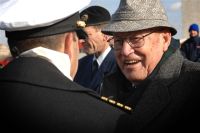WASHINGTON, Dec. 7, 2010 — One of the top U.S. Navy commanders called for today’s generation to remember the sacrifices of Americans during World War II, and to match those sacrifices as the country fights now into its 10th consecutive year of war.
Navy Adm. Jonathan Greenert, vice chief of Naval Operations, spoke to a crowd of about 100 veterans, troops and families, gathered here today at the National World War II Memorial to remember the Dec. 7, 1941 Japanese attacks on the United States.
On that early Sunday morning, the U.S. naval base on the island of Oahu, Hawaii, was attacked in what is widely recognized as one of the greatest military surprises in the history of warfare. In less than two hours, the U.S. Pacific Fleet was devastated, with more than 3,500 Americans killed or wounded.
The next day, then U.S. President Franklin D. Roosevelt called it “a date which will live in infamy.”
The attacks “galvanized” America, Greenert said, as Congress declared war on Japan, thrusting the United States into World War II, a war that would claim heavy tolls both at home and abroad.
Standing just across the river from the Pentagon where terrorists slammed a commercial jet into its walls nine years ago, Greenert said the United States is fighting a “different kind of enemy,” but the support required of Americans in this war is the same.
“Today we have to emulate those values of the World War II generation,” Greenert said. “We look to their courage and their determination, and to their commitment.” As World War II raged, families sacrificed, rationed and saved for war bonds, he said.
And, as troops returned home from war, their needs were the same as those returning from combat today. “When they come home they want what those young heroes of 1941 and throughout World War II wanted – a job, an education, a home and a better life,” Greenert said. “We have to care for them, reach out to them, seek to understand them, and ensure that they do not suffer in desperation with wounds that are both visible and invisible.” The number of World War II survivors is slowly dwindling, with only a few present at the ceremony today. This generation must embrace the responsibility to remind a new generation of what happened at Pearl Harbor, the admiral said.
“That’s why we came here today. That’s why you came here today,” he said. “Why we will always return and why we must endure to ensure that the generations that follow will always know the phrase ‘Remember Pearl harbor.’ ”
Jay Groff, an 88-year-old former warrant officer with the U.S. Army Air Corps will never forget that day, he said. He called it the “most important day of the 20th century.” “The world changed for the United States,” Groff said. But, not only for the country, he added.
“I grew up overnight,” he said. “That morning, I realized that there was somebody out there trying to kill me. That changed my outlook on life.” Sharlene Hawkes, a former Miss America, gathered with her extended family for the event. Alongside her sisters, she sang the closing hymn at the ceremony. But, Hawkes was not there as a celebrity. Her father, Robert Wells, is a World War II veteran. And, in fact, a member of her extended family has fought in every conflict since World War II. At the head of the group were the four Walser brothers from El Paso, Texas: Roy, Stensel, Kenneth and Walter. Roy survived the attack at Pearl Harbor. The others all served in World War II, and some later in Korea.
Between the four, the brothers amassed 94 years of military service. Walter died last year, but the other three attended the ceremony today. “I think the most important thing is we never forget,” Hawkes said. “We must never forget the service of anyone who has ever sacrificed and who has served. Both of those are fundamental to our way of life; to preserving our liberties.
“If we don’t recognize and honor that on a consistent, regular basis and put everything that we can behind it, then what we’re saying is ‘It’s not that critical and not that important to our way of life.’ And it is,” she said.
Hawkes’ sister, Elayne Harmer, said it also is important to remember the sacrifices of those who are still serving, and their families. “We go to the store, we go to games, and we take our kids to school, and we don’t often remember on a day-to-day basis what makes all those freedoms available to us,” she said. “And it’s important to have ceremonies like this as often as possible so that we remember the sacrifices that were made.
“Every sacrifice they make – from the families that are sacrificing, to the men and women who are putting their lives on the line – none of it is wasted,” she said. “We remember them. We think of them. We pray for them.”
Source:
U.S. Department of Defense
Office of the Assistant Secretary of Defense (Public Affairs)

 von
von 

